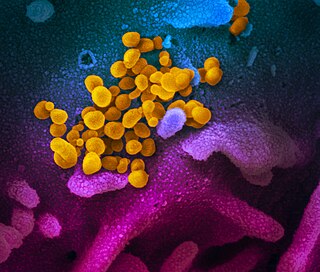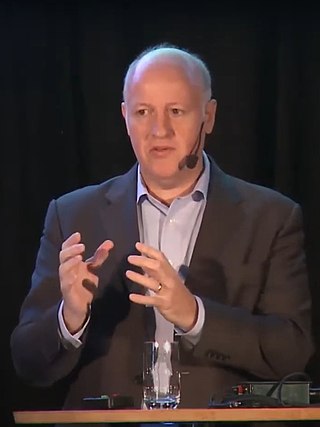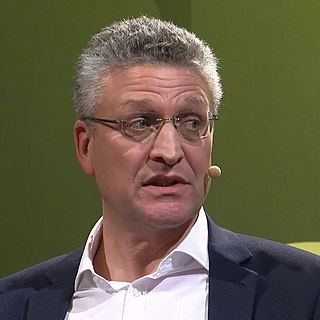Related Research Articles

A pandemic is an epidemic of an infectious disease that has a sudden increase in cases and spreads across a large region, for instance multiple continents or worldwide, affecting a substantial number of individuals. Widespread endemic diseases with a stable number of infected individuals such as recurrences of seasonal influenza are generally excluded as they occur simultaneously in large regions of the globe rather than being spread worldwide.

The Canadian Institutes of Health Research is a federal agency responsible for funding health and medical research in Canada. Comprising 13 institutes, it is the successor to the Medical Research Council of Canada.
The Global Health Security Initiative (GHSI) is a collaborative effort among several nations and organizations focused on strengthening global health security. Established in response to the 2001 terrorist attacks, its primary goal is to prepare for and address public health risks related biological, chemical, nuclear terrorism, or pandemics. The initiative includes members from North America, Europe, and Asia, with the World Health Organization participating as an observer.
Ross Upshur is a Canadian physician and researcher. He is a professor at the Dalla Lana School of Public Health of the University of Toronto in Toronto, Canada, and heads its public health division.

The Biomedical Advanced Research and Development Authority (BARDA) is a U.S. Department of Health and Human Services (HHS) office responsible for the procurement and development of medical countermeasures, principally against bioterrorism, including chemical, biological, radiological and nuclear (CBRN) threats, as well as pandemic influenza and emerging diseases. BARDA was established in 2006 through the Pandemic and All-Hazards Preparedness Act (PAHPA) and reports to the Office of the Assistant Secretary for Preparedness and Response (ASPR). The office manages Project BioShield, which funds the research, development and stockpiling of vaccines and treatments that the government could use during public health emergencies such as chemical, biological, radiological or nuclear (CBRN) attacks.
Heads of International Research Organizations (HIROs) is an organization composed of directors of International Research Organizations focussed on Health, Care and Wellbeing. It was established by Harold Varmus in 1998. Representatives from United States, Canada, The Netherlands, China, EU, India, South Africa, and South Korea. The members include director of NIH, Wellcome Trust, Korea Health Industry Development Institute (KHIDI).

Sir Jeremy James Farrar is a British medical researcher who has served as Chief Scientist at the World Health Organization since 2023. He was previously the director of The Wellcome Trust from 2013 to 2023 and a professor of tropical medicine at the University of Oxford.

The Coalition for Epidemic Preparedness Innovations (CEPI) is a foundation that takes donations from public, private, philanthropic, and civil society organisations, to finance independent research projects to develop vaccines against emerging infectious diseases (EID).

Nevan J. Krogan is a Canadian molecular and systems biologist. He is a professor and the Director of the Quantitative Biosciences Institute (QBI) at the University of California San Francisco (UCSF), as well as a senior investigator at the J. David Gladstone Institutes.

The Alliance for Biosecurity is a consortium of companies that develop products to respond to national security threats, including bioterrorism pathogens and emerging infectious diseases. It is headquartered in Washington DC.

Disease X is a placeholder name that was adopted by the World Health Organization (WHO) in February 2018 on their shortlist of blueprint priority diseases to represent a hypothetical, unknown pathogen that could cause a future epidemic. The WHO adopted the placeholder name to ensure that their planning was sufficiently flexible to adapt to an unknown pathogen. Former Director of the US National Institute of Allergy and Infectious Diseases Anthony Fauci stated that the concept of Disease X would encourage WHO projects to focus their research efforts on entire classes of viruses, instead of just individual strains, thus improving WHO capability to respond to unforeseen strains.

Syra Madad is an American pathogen preparedness expert and infectious disease epidemiologist. Madad is the Senior Director of the System-wide Special Pathogens Program at NYC Health + Hospitals where she is part of the executive leadership team which oversees New York City's response to the Coronavirus disease 2019 pandemic in the city's 11 public hospitals. She was featured in the Netflix documentary series Pandemic: How to Prevent an Outbreak and the Discovery Channel documentary The Vaccine: Conquering COVID.

Michael Joseph Ryan is an Irish epidemiologist and former trauma surgeon, specialising in infectious disease and public health. He is executive director of the World Health Organization's Health Emergencies Programme, leading the team responsible for the international containment and treatment of COVID-19. Ryan has held leadership positions and has worked on various outbreak response teams in the field to eradicate the spread of diseases including bacillary dysentery, cholera, Crimean–Congo hemorrhagic fever, Ebola, Marburg virus disease, measles, meningitis, relapsing fever, Rift Valley fever, SARS, and Shigellosis.

Christian Heinrich Maria Drosten is a German virologist whose research focus is on novel viruses (emergent viruses). During the COVID-19 pandemic, Drosten came to national prominence as an expert on the implications and actions required to combat the illness in Germany.

Peter Daszak is a British zoologist, consultant and public expert on disease ecology, in particular on zoonosis. He is the president of EcoHealth Alliance, a nonprofit non-governmental organization that supports various programs on global health and pandemic prevention. He is also a member of the Center for Infection and Immunity at the Columbia University Mailman School of Public Health. He lives in Suffern, New York.

The Access to COVID-19 Tools Accelerator, or the Global Collaboration to Accelerate the Development, Production and Equitable Access to New COVID-19 diagnostics, therapeutics and vaccines, is a G20 initiative announced by pro-tem Chair Mohammed al-Jadaan on 24 April 2020. A call to action was published simultaneously by the World Health Organization (WHO) on 24 April. As of January 2022, it was the largest international effort to achieve equitable access to COVID-19 health technologies.
Science diplomacy is the collaborative efforts by local and global entities to solve global issues using science and technology as a base. In science diplomacy, collaboration takes place to advance science but science can also be used to facilitate diplomatic relations. This allows even conflicting nations to come together through science to find solutions to global issues. Global organizations, researchers, public health officials, countries, government officials, and clinicians have previously worked together to create effective measures of infection control and subsequent treatment. They continue to do so through sharing of resources, research data, ideas, and by putting into effect laws and regulations that can further advance scientific research. Without the collaborative efforts of such entities, the world would not have the vaccines and treatments we now possess for diseases that were once considered deadly such as tuberculosis, tetanus, polio, influenza, etc. Historically, science diplomacy has proved successful in diseases such as SARS, Ebola, Zika and continues to be relevant during the COVID-19 pandemic today.

Maria Petronella Gerarda Koopmans is a Dutch virologist who is Head of the Erasmus MC Department of Viroscience. Her research considers emerging infectious diseases, noroviruses and veterinary medicine. In 2018 she was awarded the Netherlands Organisation for Scientific Research (NWO) Stevin Prize. She serves on the scientific advisory group of the World Health Organization.

Lothar Heinz Wieler is a German veterinarian and microbiologist who served as president of the Robert Koch Institute (RKI) from 2015 to 2023. In this capacity, he advised the German Federal and State Governments on topics of public health, especially infection hazards, and on the containment of the COVID-19 pandemic.
The International Severe Acute Respiratory and emerging Infection Consortium (ISARIC) is an international research initiative based in Oxford, England. It is hosted at the Nuffield Department of Medicine within the University of Oxford and led by the Epidemic diseases Research Group Oxford (ERGO). ISARIC is funded by the Bill & Melinda Gates Foundation, Foreign, Commonwealth and Development Office, and Wellcome Trust.
References
- ↑ Plank, Irene. "Global Research Collaboration for Infectious Disease Preparedness (GloPID-R)" (PDF). European Commission. Retrieved 2016-02-28.
- ↑ "European Commission : CORDIS : Projects & Results Service : Global Research Collaboration for Infectious Disease Preparedness (GloPID-R) Secretariat". European Commission . Archived from the original on 2023-01-29. Retrieved 2016-02-23.
- 1 2 3 Kaushic, Charu; Boily-Larouche, Geneviève (2020-12-17). "Coordinating research on pandemic preparedness and rapid response". Open Access Government. Archived from the original on 2023-05-01. Retrieved 2023-05-08.
- ↑ "Our milestones – Global research collaboration for infectious disease preparedness". Global Research Collaboration for Infectious Disease Preparedness. Archived from the original on 2023-03-30. Retrieved 2023-05-08.
- ↑ "Global research and innovation forum to mobilize international action in response to the novel coronavirus (2019-nCoV) emergency". World Health Organization . 2020-02-06. Archived from the original on 2022-07-18. Retrieved 2023-02-09.
- ↑ Kaushic, Charu (2020-03-26). "Message from the Scientific Director: The CIHR response to the COVID-19 pandemic - CIHR". Canadian Institutes of Health Research . Archived from the original on 2023-05-01. Retrieved 2023-05-08.
- ↑ "Members". GLOPID-R. Archived from the original on 2022-12-07. Retrieved 2016-02-28.